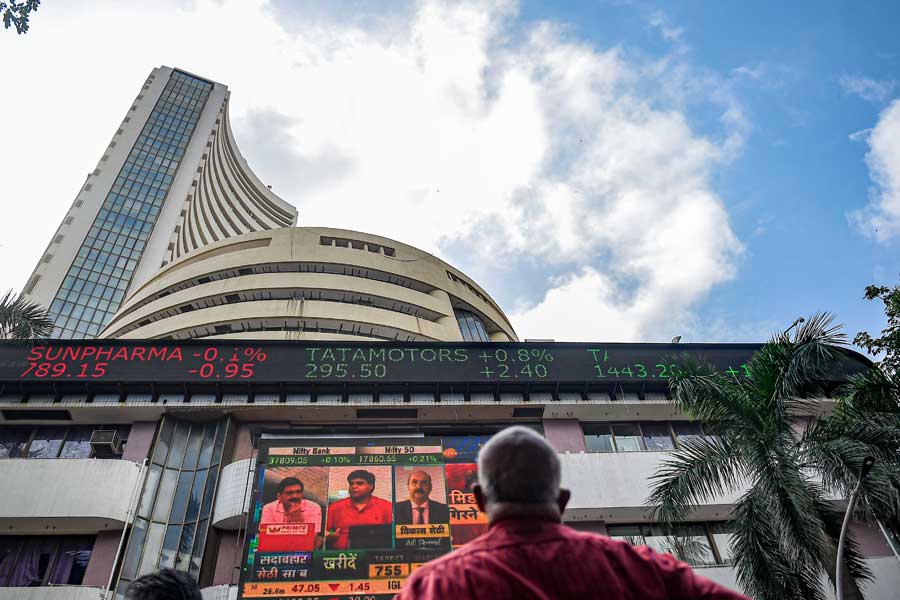The benchmark indices clawed back some of their losses on Wednesday on expectations of a stable coalition government at the Centre led by the BJP.
The 30-share Sensex leapt 2303.19 points, or 3.20 per cent, to end at 74382.24 after jumping 2455.77 points, or 3.40 per cent, to 74534.82.
Though all of its constituents ended in the green, the momentum was led by banks, auto and FMCG stocks.
On the NSE, the Nifty advanced 735.85 points, or 3.36 per cent, to 22620.35 after soaring 785.9 points, or 3.59 per cent, during intra-day trades to a high of 22670.40.
The indices got bludgeoned on Tuesday after vote counting trends showed the BJP may not have a clear majority in the Lok Sabha polls. The 30-share Sensex had nosedived 4389.73 points on Tuesday, its biggest fall in four years.
However, the uneasiness gave way to some relief on Wednesday as the alliance partners headed to the Capital to pledge their support to the government.
Some brokerages, however, appear to be betting on a slide in the equity markets in the near term.
In an India Strategy report titled “Election Impact: Going Defensive”, Emkay said: “We (have) cut our Nifty target from 24000 (December-24) to 22000 (June 25), implying near-zero returns for the market in 12 months.
“We move from a 20x forward PER (price-equity-ratio) to a 19x trailing PER to reflect the derating and risk-off expected in the markets.
“We do not see an extended bear market. The economic direction is unlikely to change for the next two-three years, though some structural reform is now on the back-burner. This may result in some earnings downgrades in the near-to-mid-term.
“However, companies will ride out this short cycle given their strong balance sheets and cash flows,” Emkay said.
Investor attention will now be drawn towards the RBI monetary policy due Friday and government formation with attention on the allocation of various portfolios.
The focus will subsequently shift to the priorities of the new government and the Union budget which could be tabled sometime next month.
The buying saw investors lapping up private sector banking shares. IndusInd Bank led the list of gainers as it jumped over 7 per cent. It was followed by Tata Steel, Mahindra & Mahindra, Bajaj Finance, Kotak Mahindra Bank, Hindustan Unilever, HDFC Bank, Axis Bank and JSW Steel which rose up to 6.55 per cent.
Foreign portfolio investors (FPIs) swam against the tide and remained net sellers.
The rupee also recovered its ground as it settled at 83.37 to the dollar against the previous close of 83.53 to the greenback. Forex circles said there was intervention by the Reserve Bank of India (RBI) that propped up the rupee. Yields on the benchmark 10-year G-sec ended lower at 7.02 per cent against the previous close of 7.03 per cent.
Rating view
The NDA’s fragile majority is likely to obstruct ambitious economic and fiscal reforms, potentially derailing efforts toward fiscal consolidation, rating agencies Moody’s and Fitch Ratings said.
Moody’s said it expected continuity in reforms regarding infrastructure spending and domestic manufacturing. However, the narrow margin of victory could slow the pace of transformative economic changes.
“India’s fiscal outcomes are likely to remain weaker compared to Baa-rated peers, despite forthcoming fiscal policy indications through 2029,” Moody’s said.
“Persistently high youth unemployment across sectors and sluggish productivity growth in the agricultural sector pose significant constraints.”
Fitch Ratings said the BJP’s reliance on coalition partners may obstruct ambitious reforms in land and labour.
“The BJP’s loss of its outright majority and its dependence on allies may pose formidable obstacles for the reform agenda,” Fitch cautioned.











